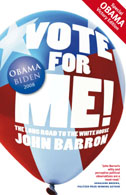 | John Barron VOTE FOR ME: THE LONG ROAD TO THE WHITE HOUSE University of NSW Press, 203 pp. Source: review copy Review by Michael Freeman |
To the untrained eye, the system used to elect the President of the United States is a little hard to follow. I suspect that even to the trained political observer, US elections can be confusing. The process can be many months old, and the financial cost in the millions of dollars, before the presidential candidates are even nominated. By the time Americans finally elect their commander-in-chief, political careers will have been crushed, the US media will have devoted millions of words to topics as crucial as where Sarah Palin obtained her latest suit, and the USA will loudly be touted by all as the
greatest democracy in the world. And just 3 short years later, they will do it all again.
In Vote For Me, John Barron attempts to reveal the inner workings of the US electoral system, and explain how the most powerful country in the free world elects its leader. He begins in the 40 degree heat of Iowa's cornfields, and ends just nine weeks before history was finally made in November 2008, with the US electing its first black president. Wisely, Barron does not simply focus on the 2008 campaign, but also regales the reader with selected anecdotes from US political history, such as the fascinating rise and fall of Senator George McGovern and President Richard Nixon. One of the book's chapters is called "Follow the Money"; an obvious reference to the mindset of the various 2008 Presidential hopefuls, but it is also the strategy that led the Washington Post to the revelations of the Watergate scandal. The intertwining of past and present is clever and seamless, and Barron has an ironic sense of humour, which is particularly suited to this subject.
Barron writes extremely well, and at times his book reads almost like a political novel than a work of non-fiction. Nevertheless his prose is always witty and engaging. There are occasions, however, such as when he quotes Rudy Giuliani, complete with lisp, where the book veers from political satire to an attempt to garner cheap laughs. Perhaps you can get away with this once, but Mr Giuliani's lisp is quoted at length. It seemed unnecessary.
As an Australian journalist, Barron is, in a sense, removed from the 12-month reality television show that is the US electoral system. This gives him a degree of objectivity American political commentators sometimes lack. On the other hand, such objectivity is hardly necessary to understand a major problem inherent in the American democratic process.
The problem is this. To be President, you need money. Lots of money, and the more you have the better your shot at the Presidency. The more money you have, the more pomp and pizzazz you can introduce to your campaign. This inevitably translates into votes. According to Barron, at one stage during the 2008 campaign for the Republican nomination John McCain was spending two million dollars a month. This is remarkable when you consider that the maximum contribution any individual can make to a Presidential campaign is $2300. The message is clear -- wealth equals good election prospects. More insidiously, it also has the potential to welcome corruption.
A country's electoral process can be characterised as a sprint, in some cases, and a middle distance run in others. Not the US. Their system is more like a marathon. Unfortunately, that fact combined with the obscene amounts of money spent along the way reduces the whole spectacle to, well, a spectacle. Not particularly dignified for the greatest democracy in the world. That, for me, was the chief lesson in Vote For Me.
[Note: since this review copy was received the publisher has printed an updated version of this book, labelling it a "Special Obama Victory Edition". We'll attempt to have a few follow-up notes at the later date to see how the additional text affects the overall work.]
